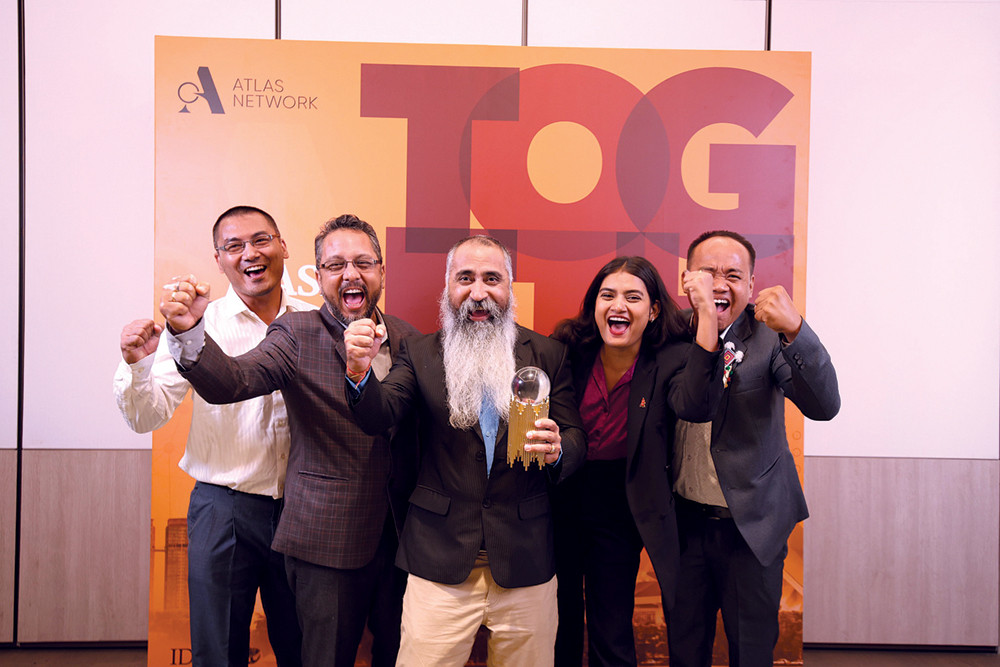.jpg)
NIKHIL AGRAWAL & ARUN AGRAWAL
Co-founders, Masta Kala
The knack of building a successful business comes from promising entrepreneurs in search of new, unique and innovative ideas. Arun Agrawal was researching new ideas for a business. Around the time, Nikhil Agrawal had just returned to Nepal after completing his Bachelor’s degree. They were invited to a mutual friend’s birthday celebration and decided to create a custom-made table organiser as a birthday gift for the friend. Arun says, “He created a custom-made table organiser as a birthday gift for a mutual friend. He used the resources available to him from his college model making supplies to craft the gift according to the birthday boy’s requirements. I was fascinated by the simplicity and beauty of the product.”
When the two started to talk, they instantaneously saw a business opportunity and decided to open Masta Kala. The company was established in 2019. Today, it has become a sought-after gifting company which focuses on providing customised gifts. Nikhil shares that their products are made in Nepal and caters to a diverse range of age groups and occasions, whether for office or personal use. He elaborates, “Our commitment to customisation, tailoring products to match the individual needs of our customers rather than promoting a fixed line of products has helped set us apart. We take pride in offering thoughtful, one-of-a-kind gifts that leave a lasting impression on the receiver.”
Why Masta Kala? The name ‘Masta Kala’ was inspired by two elements: Masta for fun and Kala for art and creativity. The co-founders feel that Masta Kala is the perfect representation of their brand’s essence.
To meet the increasing demand, they are continuously expanding their product range. Masta Kala has now ventured into merchandising, complementing their core corporate gifting services.
Like any other business startup, Masta Kala has had its share of challenges. One of the significant hurdles was getting people to buy Made in Nepal products. Nikhil says, “People tend to compare our prices to mass-produced Indian and Chinese goods. The personalised nature of our orders has resulted in a slightly higher cost for some products. It has taken time to get people to shift their perspective and appreciate the value of supporting local craftsmanship.”
He also says, “Fortunately, government policies aimed at promoting local products have been instrumental in increasing awareness and helped us in overcoming this hiccup.”
Masta Kala provides employment to about 30 people. And since its inception, it has successfully developed a strong and loyal customer base with 70% repeat clientele and referrals. Now they are working to build a global market for their products.
The owners share, “We actively promote Nepali culture through our handcrafted products. We incorporate traditional elements like festivals, architecture and cultural motifs into the designs.”
Talking about the entrepreneurial and startup culture in Nepal, Nikhil says from experience, “Seek mentorship from experienced individuals within the thriving Nepali startup ecosystem. Don’t hesitate to reach out to industry experts when facing challenges; they are often willing to offer valuable guidance and support. Leveraging the knowledge and experience of others can significantly enhance your entrepreneurial journey.” Arun adds, “For aspiring entrepreneurs with startup ideas, conduct comprehensive research to identify unique market gaps rather than copying existing ventures. Choose a niche, remain persistent, and focus on making a difference. Differentiation is key to success in a competitive market.”


.jpg)

